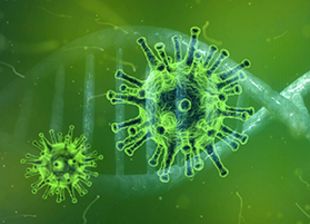"The aim of our study was to determine the incidence of diabetes after infection with SARS-CoV-2," said first author Wolfgang Rathmann, head of the Epidemiology Research Group at the DZD partner German Diabetes Center (DDZ). To investigate this question, researchers from the DDZ, the German Center for Diabetes Research (DZD) and IQVIA (Frankfurt) conducted a retrospective cohort study. This included a representative panel of 1,171 physician practices throughout Germany (March 2020 to January 2021: 8.8 million patients). Follow-up continued until July 2021. For comparison, the researchers selected a group of individuals with acute upper respiratory tract infections (AURI), which are also frequently caused by viruses.
It was already known that the human pancreas can also be a target of SARS-CoV-2. This is because reduced insulin secretion or newly developed insulin resistance has been observed in some recovered individuals following infection. SARS-CoV-2 infection can also lead to a strong release of pro-inflammatory cytokines. Activation of the immune system may persist for months after SARS-CoV-2 infection and impair insulin effectiveness (muscle, fat cells, liver).
During the study period, 35,865 people developed Covid-19. "Our analyses showed that patients with Covid-19 were more likely to develop type 2 diabetes compared with people with AURI. The relative risk of developing type 2 diabetes was 28% higher in the Covid group than in the AURI group," Rathmann said, summarizing the results.
Although type 2 diabetes is unlikely to be a problem for the vast majority of people with mild Covid-19 disease, the authors recommend that anyone who has recovered from Covid-19 should monitor for the respective warning signs and symptoms, such as fatigue, frequent urination, and increased thirst, and seek treatment immediately.
Link to the video interview of Diabetologia with Prof. Wolfgang Rathmann
Original publication:
Rathmann, W., Kuss, O. & Kostev, K.: Incidence of newly diagnosed diabetes after Covid-19. Diabetologia (2022). doi.org/10.1007/s00125-022-05670-0

